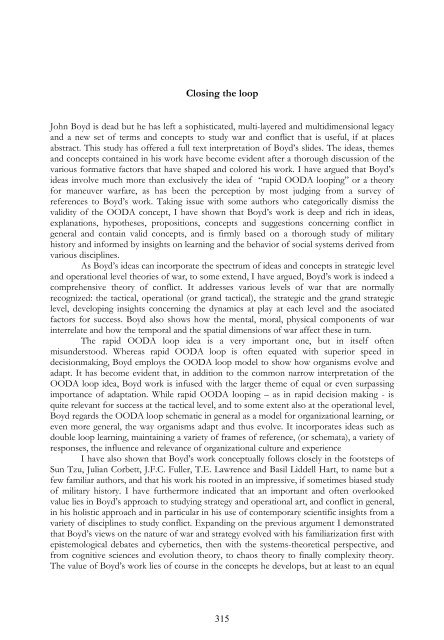Science, Strategy and War The Strategic Theory of ... - Boekje Pienter
Science, Strategy and War The Strategic Theory of ... - Boekje Pienter
Science, Strategy and War The Strategic Theory of ... - Boekje Pienter
Create successful ePaper yourself
Turn your PDF publications into a flip-book with our unique Google optimized e-Paper software.
Closing the loopJohn Boyd is dead but he has left a sophisticated, multi-layered <strong>and</strong> multidimensional legacy<strong>and</strong> a new set <strong>of</strong> terms <strong>and</strong> concepts to study war <strong>and</strong> conflict that is useful, if at placesabstract. This study has <strong>of</strong>fered a full text interpretation <strong>of</strong> Boyd’s slides. <strong>The</strong> ideas, themes<strong>and</strong> concepts contained in his work have become evident after a thorough discussion <strong>of</strong> thevarious formative factors that have shaped <strong>and</strong> colored his work. I have argued that Boyd’sideas involve much more than exclusively the idea <strong>of</strong> “rapid OODA looping” or a theoryfor maneuver warfare, as has been the perception by most judging from a survey <strong>of</strong>references to Boyd’s work. Taking issue with some authors who categorically dismiss thevalidity <strong>of</strong> the OODA concept, I have shown that Boyd’s work is deep <strong>and</strong> rich in ideas,explanations, hypotheses, propositions, concepts <strong>and</strong> suggestions concerning conflict ingeneral <strong>and</strong> contain valid concepts, <strong>and</strong> is firmly based on a thorough study <strong>of</strong> militaryhistory <strong>and</strong> informed by insights on learning <strong>and</strong> the behavior <strong>of</strong> social systems derived fromvarious disciplines.As Boyd’s ideas can incorporate the spectrum <strong>of</strong> ideas <strong>and</strong> concepts in strategic level<strong>and</strong> operational level theories <strong>of</strong> war, to some extend, I have argued, Boyd’s work is indeed acomprehensive theory <strong>of</strong> conflict. It addresses various levels <strong>of</strong> war that are normallyrecognized: the tactical, operational (or gr<strong>and</strong> tactical), the strategic <strong>and</strong> the gr<strong>and</strong> strategiclevel, developing insights concerning the dynamics at play at each level <strong>and</strong> the asociatedfactors for success. Boyd also shows how the mental, moral, physical components <strong>of</strong> warinterrelate <strong>and</strong> how the temporal <strong>and</strong> the spatial dimensions <strong>of</strong> war affect these in turn.<strong>The</strong> rapid OODA loop idea is a very important one, but in itself <strong>of</strong>tenmisunderstood. Whereas rapid OODA loop is <strong>of</strong>ten equated with superior speed indecisionmaking, Boyd employs the OODA loop model to show how organisms evolve <strong>and</strong>adapt. It has become evident that, in addition to the common narrow interpretation <strong>of</strong> theOODA loop idea, Boyd work is infused with the larger theme <strong>of</strong> equal or even surpassingimportance <strong>of</strong> adaptation. While rapid OODA looping – as in rapid decision making - isquite relevant for success at the tactical level, <strong>and</strong> to some extent also at the operational level,Boyd regards the OODA loop schematic in general as a model for organizational learning, oreven more general, the way organisms adapt <strong>and</strong> thus evolve. It incorporates ideas such asdouble loop learning, maintaining a variety <strong>of</strong> frames <strong>of</strong> reference, (or schemata), a variety <strong>of</strong>responses, the influence <strong>and</strong> relevance <strong>of</strong> organizational culture <strong>and</strong> experienceI have also shown that Boyd’s work conceptually follows closely in the footsteps <strong>of</strong>Sun Tzu, Julian Corbett, J.F.C. Fuller, T.E. Lawrence <strong>and</strong> Basil Liddell Hart, to name but afew familiar authors, <strong>and</strong> that his work his rooted in an impressive, if sometimes biased study<strong>of</strong> military history. I have furthermore indicated that an important <strong>and</strong> <strong>of</strong>ten overlookedvalue lies in Boyd’s approach to studying strategy <strong>and</strong> operational art, <strong>and</strong> conflict in general,in his holistic approach <strong>and</strong> in particular in his use <strong>of</strong> contemporary scientific insights from avariety <strong>of</strong> disciplines to study conflict. Exp<strong>and</strong>ing on the previous argument I demonstratedthat Boyd’s views on the nature <strong>of</strong> war <strong>and</strong> strategy evolved with his familiarization first withepistemological debates <strong>and</strong> cybernetics, then with the systems-theoretical perspective, <strong>and</strong>from cognitive sciences <strong>and</strong> evolution theory, to chaos theory to finally complexity theory.<strong>The</strong> value <strong>of</strong> Boyd’s work lies <strong>of</strong> course in the concepts he develops, but at least to an equal315
















